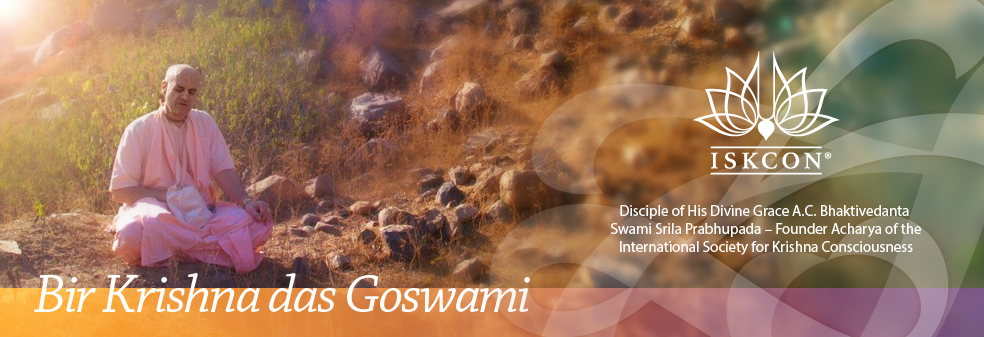Our Need for Autonomy
Autonomy is an interesting concept. It is defined as: “independence or
freedom, as of the will or one’s actions.”
It is a basic need of the soul to be autonomous, which basically means the
soul needs to be free to express itself.
Outside of Krishna consciousness autonomy is not possible for the soul. Why
is this? Krishna das Kaviraja Goswami explains this quite nicely in the
Caitanya Caritamrta:
“Because a devotee of Lord Krsna is desireless, he is peaceful. Fruitive
workers desire material enjoyment, jnanis desire liberation, and yogis
desire material opulence; therefore they are all lusty and cannot be
peaceful. (Madhya 19.149)
In other words everyone (other than a pure devote) is controlled by
cravings, whether those cravings are for gross enjoyment, liberation, or
powers in this world. The experience of cravings is not a pleasant
experience. It is an experience that agitates the mind and separates one
from contact with one’s original spiritual nature.
Recently I have been observing different cravings that people have in this
world. Sometimes cravings are described as addictions when they become
especially intense and one feels that one can not live without the object of
desire.
Generally we think of addictions as relating to some illicit drug habit. But
addictions are far more widespread than that.
For example there are food addictions (sugar, salt, fats, chocolate etc).
The proof that these are addictions is that we feel that we can not live
without these things, and we literally have psychological and physiological
symptoms of withdrawal if denied these things.
There are other things that one may be addicted to such as the experience of
falling in love, adrenaline rushes (winning a competition), conquering an
enemy, etc. Even one may be addicted to the rush of enjoying the fruits of
one’s preaching (collecting money, disciples, etc).
We should be introspective enough to understand when we have these
addictions. We should understand that these addictions are making us
miserable.
Why?
Krishna explains why in the Gita. He explains that intense hankering (being
addicted, craving, etc) comes from the mode of passion:
“The mode of passion is born of unlimited desires and longings, O son of
Kunti, and because of this the embodied living entity is bound to material
fruitive actions.” (Gita 14.7)
One interesting point about the mode of passion is that the experience one
has through endeavors in the mode of passion give one the illusion of
happiness (having nectar) in the beginning, but in the end the experience is
equivalent to taking poison. (Gita 18.38)
So, if we want to fulfill our real need for autonomy-freedom, there is a
specific course of action prescribed for us. If we don’t want to be
autonomous then we should continue with our addictions. It is up to us.
The course of action is to cultivate the mode of goodness. Of course in the
beginning that cultivation makes us think that we have increased our
suffering since we are no longer chasing after the objects of our cravings.
But in the end the cravings gradually disappear and one experiences a great
relief (nectar) (Gita 18:37)
Also we find in the Gita that on the brahman platform cravings are
non-existent, and one is qualified to transcend this world and perform pure
devotional service. (Gita 18:54) Also one experiences true happiness of the
self.
I personally experienced this with my diet. I was thinking that life without
cheese would be miserable, a life-a life not worth living! But, for sake of
serving Srila Prabhupada for a longer period of time in this body, I gave it
up. In the beginning it was difficult as the body was hankering for this,
but ultimately the bodily cravings disappeared.
Now the experience I have is that of relief. It is like breathing fresh air
or being let out of prison to no longer be controlled by that craving.
Freedom is much more blissful than being controlled by the forces of nature.
I sometimes feel like running outside and jumping for joy!
In the spiritual world we get to experience and fulfill our need for
autonomy to the fullest extent.
One may object to this statement and say that the soul is never independent
and in the spiritual world we are also controlled (under daiva prakriti or
Yoga Maya), but the experience of the spiritual realm is of
voluntarily-ecstatically serving. There is no force.
We can see how Krishna explains Krishna consciousness to Arjuna in the Gita.
He doesn’t threaten-ie: “listen to me or I will send you to hell”
He doesn’t use guilt trips- ie: “you have been my friend for my whole life.
I have given everything to you Arjuna. How could you do this to me? You are
killing me Arjuna.”
Krishna is simply explaining the facts of life to Arjuna and leaving it up
Arjuna to utilize his free will in whichever way Arjuna wishes.
This is also how we should present Krishna consciousness to others:
1. Here are the facts
2. Don’t you want to be free?
3. Don’t you want to enjoy?
4. Here is how you do it.
5. It is your choice.
Comments are closed. Please check back later.




Comments are closed. Please check back later.